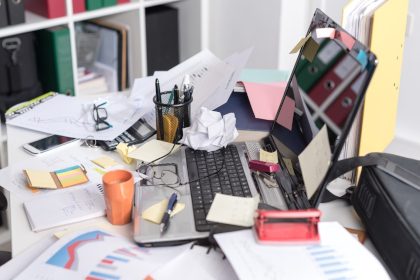Is a messy desk a sign of disorganisation and lower productivity or an indication of creativity? It’s one of those marmite arguments.
Albert Einstein asked: "If a cluttered desk is a sign of a cluttered mind, of what, then, is an empty desk a sign?" Others with cluttered desks and exceptional brains might agree, for example, Steve Jobs and Thomas Edison. To some extent the view that a messy desk is a sign of a creative mind is supported by research. Vohs, Redden and Rahinel (2013).
But a cluttered desk doesn’t mean you’re a genius. You don’t get that many Einsteins, Jobs and Edisons per square mile and for most of us a cluttered desk is just a cluttered desk. Clutter looks bad, saps energy and reduces efficiency.

The physical environment of the workplace has a significant effect on the way that we work. If you don’t file documents properly (whether they’re physical or scanned and saved to the server or cloud),you lose time every time you search. One survey showed that information workers waste up to two hours a week searching for lost digital documents.
Our work environment influences our emotions and behaviour too. Cluttered spaces can negatively affect stress and anxiety levels, as well as our ability to focus, eating choices, and sleep.
Not convinced? Researchers at the Princeton University Neuroscience Institute studied the impact of clutter on human brains. They concluded that brains like order, and constant visual reminders of disorder drain our cognitive resources and reduce our ability to focus. They also found that when participants cleared clutter from their work environment, they were better able to focus and process information, and their productivity increased.
Being in a mess can also affect our general mental health, making us feel stressed, anxious, or depressed. For instance, research in 2009 found the levels of the stress hormone cortisol were higher in mothers whose home environment was cluttered. Having higher levels of can over time lead to anxiety and depression.
And our relationships with others can also be affected by our clutter. In one study, participants with messy desks were considered by others to be less conscientious, more neurotic, and less agreeable. Such perceptions of an employee are likely to adversely influence the way that others interact with them and may have negative consequences for their career progression.
If your desk, drawers or online folders are in a mess, it’s time to spring clean. Regularly tidy your workspace. The knack is to file something as soon as you have finished working with it, so you’re only dealing with one thing at a time. That takes self-discipline, especially when you’re crazily busy. But ten seconds now will save hours in the future.
If you work at home, having a designated workspace can help create a boundary between work items and home items.
Consider having a clean-desk policy to encourage the tidiness of shared work spaces. This doesn’t mean shoving all the ness into drawers just so it’s out of sight. Drawers must be well organised too. If you haven’t done so already ask your IT people to provide support for employees in the form of tools to manage online documents efficiently, as well as clarity on what should be kept and what can be discarded.
Remember to strike a balance between practical and security considerations, and keep in mind employees’ need for self-identity and autonomy.
If you have HR queries and problems, get in touch!
Sign up for our free resources and free weekly tip - subscribe here.
Phone 0345 644 8955
LinkedIn Russell HR Consulting
DISCLAIMER
Although every effort has been made to ensure the accuracy of the information contained in this blog, nothing herein should be construed as giving advice and no responsibility will be taken for inaccuracies or errors.
Copyright © 2019 all rights reserved. You may copy or distribute this blog as long as this copyright notice and full information about contacting the author are attached. The author is Kate Russell of Russell HR Consulting Ltd.
Latest blog posts
- Is There a Santa Clause?
06 / 12 / 2023
- Lend Us a Hand!
22 / 11 / 2023
- What Happens When There is a Clash in Protected Characteristics?
17 / 10 / 2023
- Encouraging a Healthy Workforce 2
21 / 09 / 2023
- Encouraging a Healthy Workforce
23 / 08 / 2023
- What a Disaster - (But We Have a Cunning Plan!)
20 / 07 / 2023
- It’s Time We Stiffened the Sinews
14 / 06 / 2023
- Why Is It So Important to Develop Emotional Resilience?
16 / 05 / 2023
- When is a discretionary bonus not discretionary?
20 / 04 / 2023
- Recovering Training Costs 15 / 03 / 2023
